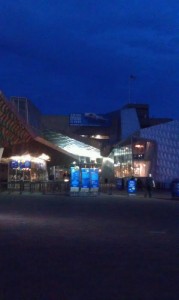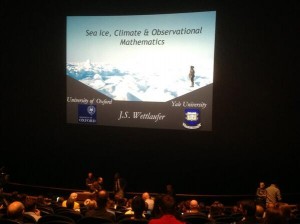Last night I posed a question to a few sciobeantown folks asking what was their “gateway science” – the topic that got them interested in science in general, the thing that hooked them. It seemed to me that the most common answers were either space or had something to do with animals, whether on land or at sea. This got me thinking about how if animals are the gateway, then zoos and aquariums are really the gatekeepers – the ones with the ability to open up a whole world of science.
This is a fairly fitting observation, since sciobeantown had just left the New England Aquarium when this conversation took place. I quite unabashedly love the aquarium, and its affiliated IMAX theater; it is where I spent my 25th birthday, because I am a grown up. The reason sciobeantown decided to take it to the Aquarium for our October event was because we wanted to give our group a little taste of ScioOceans, a conference going on in Miami geared toward communicating online about, what else, ocean science.
The Aquarium recently reopened several exhibits after being under construction (the penguins are back!) Additionally, they moved their public lectures out of their classroom space and into the IMAX theater – because power points are more acceptable when they are epic IMAX power points. We attended their most popular event of the year the John Carlson Lecture presented by MIT’s Lorenz Center. The topic for this talk was Sea Ice, Climate and Observational Mathematics and was given by John Wettlaufer a professor at Yale and Oxford.
I was fairly impressed by the turn out, it seemed to me that there was a real range of people, from students to retirees who seemed interested and engaged. Like all things, the talk had some positive and negative things. I loved that Wettlaufer took the time to explain what it means to be a scientist, and how science is so many different things all adding their own value. I also loved that he addressed uncertainty and spoke a bit about the perception of science. I felt like he went into a little too much detail about his research itself – by all means, show us what you do, but the screen of equations at a public talk was a little much for me.
Overall I thought it was a great experience, and I’m glad we were able to attend and bring our livetweeting skills. I’ve put together a storify of our tweets in case you’d like to know more about exactly what was covered in the talk. Special thanks to the New England Aquarium for having us, I’m looking forward to coming back to check out the new exhibits! Also, if you are interested you can follow the Aquarium on twitter @neaq and follow along with @ScioOceans #ScioOceans.


Hi Erin,
It was in no way the fault of the aquarium, but the lecture was not of an illuminating quality. I’m saddened that the lecture drew in so many people, probably all curious to actually learn something about sea ice and climate change. In fact, it’s very possible that some went away with the idea that sea ice loss is simply a product of natural variability, when there is a long-term decreasing trend due to warming that Wettlaufer did not explain at all. To put matters lightly, no scientist in the audience was happy with the talk or thought it was valuable in any way. We were embarrassed. In fact, it obscured the most important issues in climate change. A public disservice.
Did you not find it funny that after the lecture, someone in the audience asked him how he would explain the importance of his research to “someone on the street”? We were a crowd of those very people, and he had just talked to us for an hour. It was a missed opportunity for some real public science communication, no question.
Glad you put so much effort and enthusiasm into communicating science, but sciobeantown should be critical when necessary.
Hi Caliope, thanks for commenting. As a non-expert member of the general public, I in no way shape or form thought that the talk suggested that climate change was anything other than a man-made phenomenon.
As a non-expert, I don’t really feel qualified to comment on what content he put into his talk. That said, I can see why as a scientist you might have been frustrated with the fact that the talk stuck to explaining the natural mechanisms and did not go into the man-made drivers. Though I thought some of the diagrams Wettlaufer presented, like the loss of sea ice between 1979 and 2007 made the case well.
Overall was it particularly compelling? No. But, I didn’t think it was inaccurate (if you, as a scientist can point out any errors or misrepresentations I would encourage you to do so.) I always strive to represent science truthfully and wouldn’t want to support something that gets the science wrong.
I do not feel like it is my duty to comment on the fact that Wettlaufer did not take an advocacy position. It was my impression the Wettlaufer sees himself strictly as presenting facts and not as a communicator or advocate. I thought that message came through quite clearly when he was asked about how to best communicate and he deflected the answer to the science of science communication (of which there is an extensive body of work on climate change communication) saying he does not know how best to communicate.
I know it then begs the question of why he was giving a public talk in the first place- perhaps he was not the best choice, but I truly don’t want to discourage any scientist from getting out into the public through a personal attack on their communication skills. I can’t think of any good that would come from it. Communication is hard. Going from a scientific talk to a public talk is hard. Gauging an audience is hard. I don’t think Wettlaufer hit the mark, but I wouldn’t go so far as to call it a public disservice.
If he asked me how to be better, I would tell him to lose the terms and speak more plainly, and to insert a narrative. Tell it like a story, rather than explain an equation. I don’t disagree with you that the lecture was a good opportunity for public engagement, and that it is disappointing that didn’t occur, but again I don’t know what good would have come from personally attacking his approach.